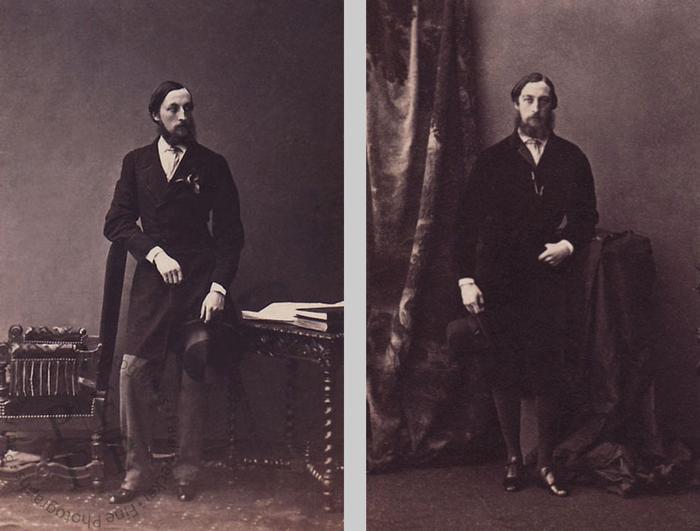The Honourable Walter Harbord
(1834-1913)
Volume 1, page 235, sitting number 1126.
The Honourable Walter Harbord was born on 1 July 1834, the sixth son of Edward Harbord, 3rd Baron Suffield, his fourth son by his second wife, Emily Harriot née Shirley. He entered the Army, serving in the 7th Hussars and rising to the rank of Major.
In 1875 he was caught cheating at cards in a casino at Nice. The men whom he had defrauded beat him soundly and he was thrown out by the servants. The incident caused a huge international scandal, furnishing the foreign press with many column inches. Needless to say, Harbord was expelled from the Army and all his clubs. Amazingly, within a few months he had wed a wealthy widow who had taken pity on him and offered her hand in marriage. Despite the fact that marriage to him would mean social ostracism for his wife, Harbord accepted the offer with alacrity and on 5 May 1875, he married Lady Eleanor Fitzroy, daughter of Augustus Charles Lennox Fitzroy, 7th Duke of Grafton. The couple were forced to live abroad for many years, in disgrace and under the ban of English and continental society. Despite her kindness and generosity, Harbord took out much of his frustration, bitterness and resentment on his wife.
On 1 May 1900, the Times reported on Harbord v. Harbord, ‘the petition of Lady Eleanor Harbord for the dissolution of her marriage with the Hon. Walter Harbord by reason of his cruelty, and adultery with Ada de St Croix.’
‘Mr. Deane, Q.C. (Mr Le Bas with him), said that the parties were married on May 5, 1875, at the church of St Swithin, in the City of London, and there were two children living of the marriage – a married daughter and a son in the Navy. The petitioner was the daughter of the Duke of Grafton, and at the date of her marriage was the widow of Mr Herbert Fitzroy Eaton. After the marriage the parties for some years lived abroad, but on their return to England the respondent began to treat his wife, not only with persistent neglect and great unkindness, but also with personal violence. He was constantly in the company of demi-mondaines, and on one occasion when the petitioner was at the Earl’s Court Exhibition with a party of friends, he walked past with one of these women, although the petitioner had previously requested him not to visit the exhibition on that particular evening. On another occasion, in the early morning, the petitioner found empty champagne bottles and ribbons and hairpins in her husband’s study. To this day she could not be sure whether he had had a visitor there that night, or whether he had merely “dressed” the room to cause her annoyance. On several occasions he had bruised her arms, and on one occasion he threw her to the ground. Matters reached a climax in September 1897, while they were visiting at Wakefield Lodge, the Duke of Grafton’s house, near Stony Stratford; and there the petitioner’s health broke down owing to the respondent’s violence. Under the advice of her medical advisers she on January 18, 1898, insisted on the execution of a separation deed, under which the respondent covenanted not to reside in England. He accordingly went to live in Jersey, and recently the petitioner having discovered that he was living maritalement at First Tower, near St Helier’s, with a woman named Ada de St Croix, the present suit was instituted.
‘Evidence was given in support of the petition, it being stated that “the respondent treated the petitioner as badly as a man could treat his wife.”
‘Medical evidence having also been given as to the petitioner’s health having been completely shattered by her husband’s violence, the President said that the charges of cruelty and of adultery had both been established. He must therefore pronounce a decree nisi with costs.’
After his divorce, Harbord married, secondly, in 1901, Mary Read, daughter of W. Read. He and his second wife appear on the 1901 census, living at 38A Clarence Parade in Portsmouth. He gave his profession as ‘Retired Major’ and his age as 60, when in fact he was 66. His wife, Mary, who was born in Ireland, was 28 years old. Their dwelling comprised only two rooms and, needless to say, they had no servants.
The Honourable Walter Harbord died on 28 January 1913 at the age of 78, leaving effects valued at £307. His death took place at 58 Grosvenor Street in Mayfair, though at the time his usual address was 45 Salisbury Road, Southsea.

